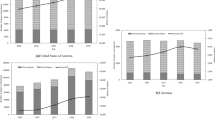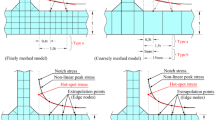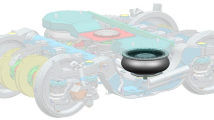Abstract
We studied the effect of mean stress correction factor using the Rainflow counting technique to assess the fatigue damage of an automobile crankshaft under service loading by considering the stochastic process of the Markov chain. The failure of the crankshaft will cause serious damage to the engine and also to other connecting subcomponents. The service loading is computationally generated from the Discrete Markov chain model and the fatigue cycle is counted using the Rainflow counting technique with the consideration of the local minima and maxima load. To quantify the fatigue damage, the strain-life curve using the fatigue mean stresses was used to model the fatigue failure of the material used in for the crankshaft at N f = 10 6. The fatigue mean stresses were used to estimate the effects of the mean stress on the fatigue strength of the component under service loading condition. Statistical verification with the boundary condition of the 90% confidence level was performed to observe the difference between the stochastic algorithms when compared towards the fatigue life behavior of the ductile cast iron material. We concluded that for the practical application, the proposed stochastic model provides a highly accurate assessment of fatigue damage prediction for improving the safety and controlling the risk factors in terms of structural health monitoring.
Similar content being viewed by others
References
M. Sander, T. Müller and J. Lebahn, Influence of mean stress and variable amplitude loading on the fatigue behaviour of a high-strength steel in VHCF regime, International J. of Fatigue, 62 (2014) 10–20.
J. R. Bisping, B. Peterweth, C. Bleicher, R. Wagener and T. Melz, Fatigue life assessment for large components based on Rainflow counted local strains using damage domain, International Journal of Fatigue, 68 (2014) 150–158.
D. Benasciutti and R. Tovo, On fatigue cycle distribution in non-stationary switching loadings with Markov Chain structure, Probabilistic Engineering Mechanics, 25 (2010) 406–418.
D. H. Jung, H. K. Kim, Y. S. Pyoun, A. Gafurov, G. C. Choi and J. M. Ahn, Reliability prediction of the fatigue life of a crankshaft, J. of Mechanical Science and Technology, 23 (2009) 1071–1074.
M. A. Alfares, A. H. Falah and A. H. Elkholy, Failure analysis of a vehicle engine crankshaft, J. of Failure Analysis and Prevention, 7 (1) (2007) 12–17.
M. Fonte, B. Li, L. Reis and M. Freitas, Crankshaft failure analysis of a motor vehicle, Engineering Failure Analysis, 35 (2013) 147–152.
X. Chen, X. Yu, R. Hu and J. Li, Statistical distribution of crankshaft fatigue: Experiment and modelling, Engineering Failure Analysis, 4 (2014) 210–220.
F. S. Silva, Analysis of a vehicle crankshaft failure, Engineering Failure Analysis, 10 (5) (2003) 606–616.
S. K. Bahumik, R. Rangaraju, M. A. Venkataswamy, T. A. Baskaran and M. A. Parameswara, Fatigue fracture of crankshaft of an aircraft engine, Engineering Failure Analysis, 9 (3) (2002) 255–263.
J. A. Becarra, F. J. Jimenez, M. Torrez, D. T. Sanchez and E. Carvajal, Failure analysis of reciprocating compressor crankshafts, Engineering Failure Analysis, 18 (2) (2011) 735–46.
R. K. Pandey, Failure of diesel engine crankshaft, Engineering Failure Analysis, 10 (2) (2003) 165–175.
C. Changli, Z. Chengjie and W. Deping, Analysis of an unusual crankshaft failure, Engineering Failure Analysis, 12 (3) (2005) 465–473.
O. Asi, Failure analysis of a crankshaft made from ductile cast iron, Engineering Failure Analysis, 13 (8) (2005) 1260–1267.
A. Ktari, N. Haddar and H. F. Ayedi, Fatigue fracture expertise of train engine crankshafts, Engineering Failure Analysis, 18 (3) (2011) 1085–1093.
I. Rychlik, A A new definition of Rainflow cycle counting method, International J. of Fatigue, 9 (2) (1987) 119–121.
I. Rychlik, G. Lindgren and Y. K. Lin, Markov based correlations of damage cycles in Gaussian and non-Gaussian loads, Probabilistic Engineering Mechanics, 10 (1995) 103–115.
I. Rychlik and M. Frendahl, Rainflow analysis: Markov method, International J. of Fatigue, 15 (4) (1993) 265–272.
I. Rychlik, Simple approximations of the rain-flow cycle distribution for discretised random loads, Probabilistic Engineering Mechanics, 4 (1) (1989) 40–48.
P. Johannesson, On Rainflow cycles and the distribution of the number of interval crossings by a Markov chain, Probabilistic Engineering Mechanics, 17 (2002) 123–130.
Y.-L. Lee and D. Taylor, Strain based fatigue analysis and design- Fatigue testing and analysis, Elsevier Butterworth-Heinemann, USA (2005).
K.-S. Lee and J.-H. Song, Estimation methods for strainlife fatigue properties for hardness, International J. of Fatigue, 28 (2006) 386–400.
M. V. Borodii and M. P. Adamchuk, Life assessment for metallic materials with the use of the strain criterion for low cycle fatigue, International J. of Fatigue, 31 (2009) 1579–1587.
I. Marines, X. Bin and C. Bathias, An understanding of very high cycle fatigue of metals, International J. of Fatigue, 25 (2003) 1101–1107.
P. Bocchini, D. Saydam and D. M. Franggopol, Efficient, accurate and simple Markov Chain Model for the life cycle analysis of bridge groups, Structural Safety, 40 (2013) 51–64.
O. C. Ibe, Markov Processes for Stochastic Modeling, Second Ed., London Elsevier (2013).
J. M. Tartaglia, Technical article: Comparison of Monotonic and Cyclic Properties of Ductile Irons in the AFS/DOE Strain-life fatigue database for cast iron, Element Wixom Michigan, American Foundry Society (2012).
O. Karakas, Consideration of mean-stress effects on fatigue life of welded magnesium joints by the application of the Smith–Watson–Topper and reference radius concepts, International J. of Fatigue, 49 (2013) 1–17.
M. Buciumeanu, I. Crudu, L. Palaghian, A. S. Miranda and F. S. Silva, Influence of wear damage on the fretting fatigue life prediction of an Al7175 alloy, International J. of Fatigue, 31 (2009) 1278–1285.
E. Kreyszig, Advance engineering mathematics, 7th ed., Wiley (1993).
E. Bayraktar, I. M. Garcias and C. Bathias, Failure mechanisms of automotive metallic alloys in very high cycle fatigue range, International J. of Fatigue, 28 (2006) 1590–1602.
B. Villanueva, J. A. F. Jiménez Espadafor, F. Cruz-Peragón and M. Torres García, A methodology for cracks identification in large crankshafts, Mechanical Systems and Signal Processing, 25 (8) (2011) 3168–3185.
G. Salerno, R. Magnabosco and C. M. Neto, Mean strain influence in low cycle fatigue behaviour of AA7175-T1 aluminum alloy, International J. of Fatigue, 29 (2007) 829–835.
S. Taheri, L. Vincent and J-C Le-Roux, Classification of metallic alloys for fatigue damage accumulation: A conservative model under strain control for 304 stainless steels, International J. of Fatigue, 70 (2015) 73–84.
I. S. Cho, The influence of boundary conditions on the lubrication characteristics of a J. bearing for reciprocating compressors, J. of Mechanical Science and Technology, 29 (2) (2015) 751–758.
Author information
Authors and Affiliations
Corresponding author
Additional information
Recommended by Associate Editor Jin Weon Kim
Singh Salvinder is currently a Lecturer at the Department of Mechanical Engineering, Politeknik Ungku Omar, Malaysia. He received his Ph.D. in Mechanical Engineering from Universiti Kebangsaan Malaysia, Malaysia in 2016. His research interests include reliability engineering, damage mechanics, fatigue data analysis, fatigue failure, structural integrity and durability analysis.
Abdullah Shahrum is currently a Professor and Head of the Department of Mechanical and Material Engineering, Universiti Kebangsaan Malaysia. He received his Ph.D. from the University of Sheffield, United Kingdom, in 2005. His research interests include fatigue failure, FEA-based fatigue analysis fracture mechanics, damage mechanics, fatigue data analysis, signal analysis and mechanics of materials engineering design.
Nik Abdullah Nik Mohamed is currently a Professor of Mechanical Engineering, Universiti Malaysia Pahang, Malaysia. He received his Ph.D. from Technische Universität Berlin, Germany in 1991. His research interests include continuum mechanics, material theory, reliability engineering, smart materials and peridynamics.
Rights and permissions
About this article
Cite this article
Salvinder, S., Shahrum, A. & Mohamed, N.A.N. Discretized Markov chain in damage assessment using Rainflow cycle with effects of mean stress on an automobile crankshaft. J Mech Sci Technol 30, 3539–3551 (2016). https://doi.org/10.1007/s12206-016-0714-4
Received:
Revised:
Accepted:
Published:
Issue Date:
DOI: https://doi.org/10.1007/s12206-016-0714-4




